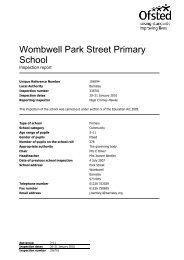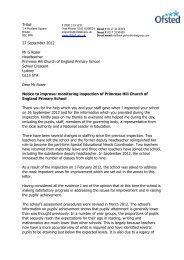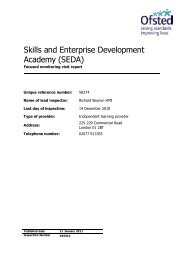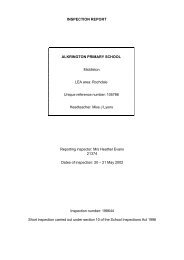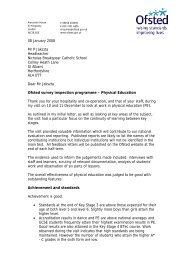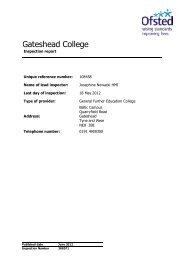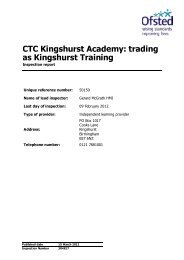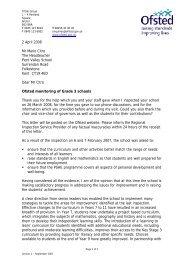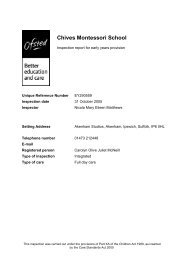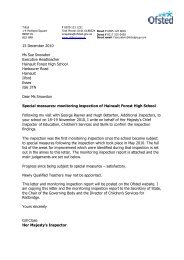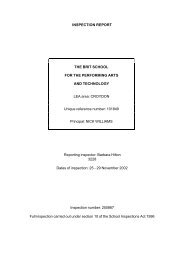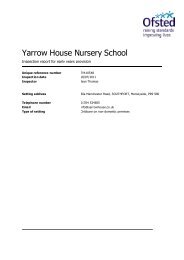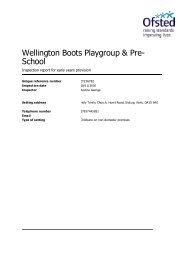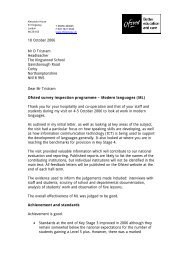pdf Section 3 inspection report - Ofsted
pdf Section 3 inspection report - Ofsted
pdf Section 3 inspection report - Ofsted
You also want an ePaper? Increase the reach of your titles
YUMPU automatically turns print PDFs into web optimized ePapers that Google loves.
learning remains inconsistent; the need for a simple and robust system that will<br />
allow the monitoring and evaluation of achievement is a priority.<br />
Appropriate steps have been taken to provide more systematic support to pupils<br />
with special educational needs. The teaching assistants are appropriately deployed<br />
to ensure that the statemented pupils and those on school action plus receive their<br />
full entitlement. However, there are insufficient specialist teachers within the<br />
department to fully meet the needs of the school. The procedures for referral and<br />
support have been updated and refined. Learning support assistants have been<br />
reorganised to provide targeted support for most curriculum areas and for<br />
individual pupils. Subject areas have not yet taken full responsibility for meeting<br />
the individual learning needs of these pupils. The learning support unit now<br />
operates separately from the exclusion unit and provides a more dedicated<br />
programme of work on basic skills. The support available to the pupils at the initial<br />
stage of learning English as an additional language is good; however, the level of<br />
staffing is inadequate for those at the intermediate stage of learning English.<br />
Provision for the sixth form is satisfactory but is impeded by the small size of many<br />
teaching groups. The quality of teaching and learning is satisfactory overall. Sixth<br />
form teachers now meet regularly to share good practice and focus on teaching<br />
and learning. Directed study time has been introduced and the Gifted and Talented<br />
co-ordinator is working with six Year 12 students who have taken part in taster<br />
days at Oxford University.<br />
The sixth form curriculum is being expanded in 2005-06 to include an extended<br />
range of vocational courses. This is appropriate for the pupils and meets the needs<br />
and aspirations of the local community. A number of courses currently being<br />
offered have too few pupils to be economically viable and educationally stimulating.<br />
The school is rightly pursuing the urgent development of a dedicated sixth form<br />
study area with access to computer facilities. The quality of the pupils’ tutorial<br />
experience is variable. The introduction of target minimum grades has helped the<br />
pupils’ to understand what is achievable. The school’s academic monitoring sheets<br />
indicate that most students in Year 13 will achieve their expected grades.<br />
However, an analysis of pupil performance in Year 12 revealed that a significant<br />
number underachieved. At 57 per cent, attendance rates in Year 13 are far too<br />
low. The introduction of the education maintenance allowance, which benefits<br />
approximately 50 per cent of Year 12 students, has helped to improve attendance<br />
rates in Year 12 to 88 per cent.<br />
The leadership of the interim headteacher has brought stability and improved<br />
organisation to the schools. The spring term review of the school’s strengths and<br />
weaknesses made a significant contribution to the revised action plan. The plan is<br />
satisfactory, has clarified areas of delegated responsibility and provides an



